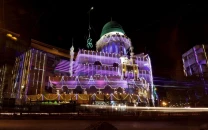Year in review: 2011 - the year that shouldn’t have been
2011 was a year that would probably rank as among the worst for Pakistan.

Since public — and individual — memory is short, it’s best to start from the most recent ‘events’ (if one can call them that) and look backwards.
The first would have to be Memogate. Here, we have the army chief and the chief of the ISI filing affidavits before the Supreme Court, accusing the government, basically, of acting against the country’s interests and indulging in an act that is illegal. Why else would they insist that the memo, which they say definitely exists, should be investigated – as to who wrote it and to what end.
One shouldn’t forget that the army chief reports, in theory at least, to the defence secretary, who in turn reports to the defence minister, who in turn reports to the prime minister. The ISI chief is answerable, or reports to the army chief. So technically, the prime minister and the president, as per the Constitution and the government’s organisational hierarchy, are all far senior to him. Despite that, he went to London to meet a man, who in the past had written many an inflammatory article against the Pakistani military and its intelligence agencies, apparently to ascertain if the memo was authentic and to verify the details contained in it. The casualty of this was Husain Haqqani who resigned saying that he did not want to hinder the inquiry.
Mansoor Ijaz’s detailed BlackBerry messenger transcripts, however, also mentioned a plot to change the government and in which, it was alleged, the head of the ISI had travelled to friendly states in the Arab world to brief their leaders on this plan by the military. While ISPR eventually denied this several days after this detail was highlighted, at the very least, the DG ISI’s own investigations into the memo, which, for the sake of argument, was targeting his parent organisation, should have no relevance to the case. He cannot be a party to his own case and as such the government should have asked him to explain why he had gone to London to meet with Ijaz. The case is continuing before the Supreme Court and one would have to concur with Asma Jahangir’s comments that if one were to go by the army and ISI chiefs’ statements then all politicians in the country are traitors.
Looking further back, there were other milestones in the year, but all of them were such that the year would have been better off if they had not happened. The next one that comes to mind would have to be the Abbottabad raid of May 2. Here, we found, much to our surprise (or not, depending if you were a cynic) that the world’s most wanted man, Osama bin Laden, was living in Abbottabad, less than two hour’s drive from the federal capital.
However, we still have people who think that a) Osama died in 2003; b) This was an elaborate hoax by the Americans so that Barack Obama’s re-election bid could get a boost and c) That he never was in Abbottabad because there was no picture ever shown of his dead body, which was rather conveniently fed to the sharks of the Arabia Sea.
Instead of wondering what he was doing in Abbottabad, a garrison city more or less, all the wrong questions were asked. The issue didn’t become that why wasn’t he detected or why the armed forces didn’t detect American helicopters a good 200 kilometres inside Pakistan — including, as many reports said, some landing on the way in the Kala Dhaka area — but rather that how dare the Americans violate our sovereignty.
There was other unpleasantness in the year too. Perhaps, the other two or three major blots were the assassinations of federal minorities minister Shahbaz Bhatti and Punjab Governor Salmaan Taseer. It was only because the latter was killed by his guard, who turned himself in, that the state was able to solve one of the cases. But as we all know, even the lower court judge who convicted Mumtaz Qadri saw his courtroom ransacked by some of Rawalpindi’s finest black coats and had to then flee the country. Bhatti’s murder remains unresolved and will probably stay that way.
On the penultimate day of the year, the Supreme Court admitted PML-N chief Nawaz Sharif’s petition on Memogate and constituted a judicial commission of its own, at a time when a parliamentary commission was also seized of the matter. The new year will now tell us whether the elected government completes its full term in office or whether the military is yet again able to get its own way.
2011 also saw the rise of the so-called ‘tsunami’ of Imran Khan, a term avidly promoted by PTI followers without realising that it causes much destruction and mayhem in the real world. However, after two massively successful rallies in Lahore and Karachi, those observing the party’s rising fortunes are still wondering how its leader will achieve all that he claims he will do if elected to public office.
On that note, Happy New Year.
The writer is Editorial Pages Editor of The Express Tribune and can be found on Twitter @omar_quraishi
Published in The Express Tribune, December 31st, 2011.



















COMMENTS
Comments are moderated and generally will be posted if they are on-topic and not abusive.
For more information, please see our Comments FAQ